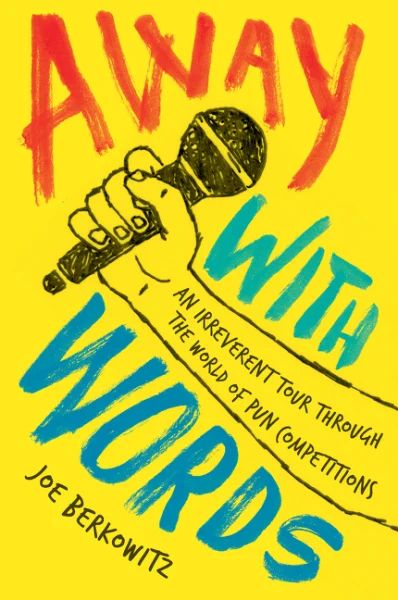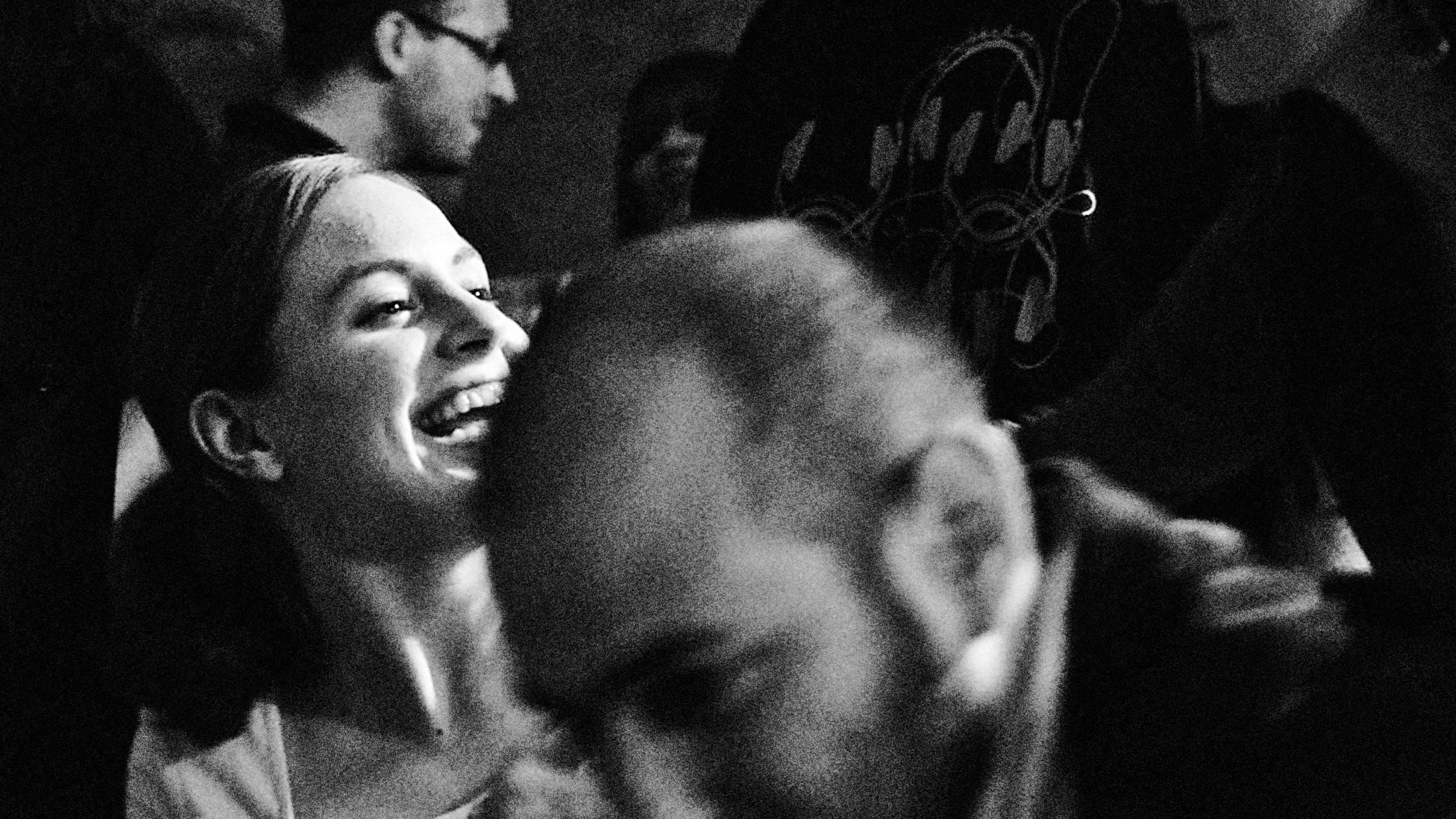A lot of you enjoyed last week’s interview with Fast Company’s own Joe Berkowitz about his year exploring the subculture of competitive punning. This is an exclusive excerpt from the book born out of that year: Away With Words: An Irreverent Tour Through the World of Pun Competitions, which is available now.
Although it’s become passé at this point, one longtime mantra of this city is Keep Austin Weird. It’s splashed across T-shirts sold at Zilker Park during the annual Kite Festival, it’s plastered on paint-peeled bumpers of Toyota Tercels en route to yarn-bomb a tree, probably, and it’s nowhere near the nude bodies undulating in the clothing-optional swimming park called Hippie Hollow. Although the vast empire of high-rises and high-end restaurants have added a slick sheen recently, Austin is still indeed weird. Its weirdness is thrust upon you the moment you arrive at the airport, greeted by fifteen-foot, psychedelically colored guitars in a v-formation around the baggage claim, as if standing sentry lest ill-tempered mutant drums invade. If the town in Footloose was weird for outlawing dancing, Austin seems like the type of weird where dancing might be enforced on certain government holidays. It’s a weirdness that encompasses Brooklyn’s, in that both places seem like they might have a hopscotch league, but Austin’s stands out more for being an oasis in the reddest of red states. The friends I’m staying with live next to a chrome rocket of a food trailer called Ms P’s Electric Cock, and a wax museum built like a grimy gothic castle with functional dungeon. When I go for a run, it’s over a bridge known colloquially as Bat Bridge, for reasons I don’t want spelled out until I am far away from the bridge. This is a weird city and the O. Henry Pun-Off definitely belongs here.
Punning itself may not be that weird, but the ceaseless spigot of puns that flows unimpeded at the Pun-Off might as well be directed by David Cronenberg. To oblivious passersby, it must sound like a foreign language one intuitively knows to be Elvish or Klingon, a knotty thicket of nerd twaddle. To the people inside, though, it’s paradise. Anywhere else, the chance of being overheard could be embarrassing for punsters, but not here. Those who are magnetically pulled to the Pun-Off are like Amish teens on Rumspringa. For one weekend, any and all interruptive, conversation-killing word balloon animals are not only welcome—they’re encouraged. There is no safe word here. (If there were, though, it would be a pun and it would be terrible.)
Related: This Guy Spent A Year Exploring The Subculture Of Competitive Punning
For Gary Hallock, an old school Austinite, this sanctuary has no exit. Puns are an indelible part of his life, year-round. The green zone this town has created for ardent wordplay enthusiasts has encroached ever further into Hallock’s head, annexing his brain and claiming it as pun territory.
Beneath a rotating haberdashery of unconventional headgear, Gary has a friendly face with soft-blue eyes and deep-set laugh lines, probably collateral pun damage. His hair is the color of sidewalk, but his bushy eyebrows are a shade darker. He has a rascally gleam in his eye, like he’s always either just heard a joke or is about to deliver one. As Gary tells me his life story, though, he slips in very few puns. It’s unclear whether the omission is for my benefit—all the unmade puns quietly eating him up inside.
Puns are there in his waking hours, and they’re there when he goes to sleep.
“I put music on in the background at night to keep the idle parts of my brain from thinking about puns,” Gary tells me. “I fall asleep with a little speaker in my pillow, listening to talk radio, because if I don’t, I will lie awake thinking of stuff, and inevitably, I’ll think of a pun, and then I’ll wish I could get up and go write it down.”
We’re inside of a vegan ice cream shop in North Austin that Gary’s friend, Valerie Ward, owns. You can tell one of Gary’s friends owns it because we’re seated perpendicular to a doctored poster for the film A Time to Kill that now reads A Time to Kale. A young Matthew McConaughey, sleek as an otter, is arguing a court case dead center, his clenched, emotive fist made to look as if it’s clutching a stalk of kale. When I gesture toward it, Gary chortles. He has probably heard or said the word kale in place of kill thousands of times more than the average human.
Gary first competed in the Pun-Off in 1985, and did not do particularly well. He kept coming back, though, until he won first place four years later. At that point, he decided to retire, going out on top like when Michael Strahan left the Giants and also when he left Live! With Kelly & Michael. Gary sensed that the competition had grown a tad stale over the past few years, and needed some shaking up. When he spoke to the curator about it, she charged him with restoring the O. Henry to its former glory the following year. Gary accepted, forming a committee of like-minded word-nerds to assist with the reformation, founding a group called PUNY—Punsters United Nearly Yearly. Together, they codified some long unspoken rules of the competition. They also added “World Championships” to the title, so that upstarts like the Almost Annual Pun Competition in Eureka, California, wouldn’t beat them to the punch.

Despite his devotion, though, Gary originally became a punster by default. Growing up, he’d strived to be a comedian, dutifully going to open mics and doing his time onstage, but it just never gelled. All it took was one round at the O. Henry, though, for him to realize he was a punster who enjoyed comedy and not a comedian who enjoyed puns. Gary admires stand-up comics who can get away with puns, but he recognizes that they’re few and far between. (He cites as an example Carrot Top, the shockingly jacked prop comedy golem fated to haunt Las Vegas forever like Jack Nicholson in The Shining.) Following that first O. Henry, Gary spent the next thirty years deeply involved in pun competitions. It’s long since become an integral part of his identity. He may be a property manager by trade, but that’s not who he is. He is Mr. Pun.
“When you have a reputation like I do, any time I open my mouth, people are expecting it, and bracing for it, and cringing,” he says. “When I start talking, I can sense that tension. People are waiting for me to throw a pun in. So if I do go ahead and throw one in to relieve the tension, people think that’s the point I was trying to make, and they miss the point. It’s like dressing in a clown costume and expecting people to take you seriously. Because I’m basically in a clown costume 24/7.”
Joe Berkowitz will be celebrating the book with a comedy show and podcast at QED in Astoria, Monday 6/26 at 7 p.m. He will be joined by comedians Christian Finnegan, Myq Kaplan, and the champions of Punderdome.
Recognize your brand’s excellence by applying to this year’s Brands That Matter Awards before the early-rate deadline, May 3.
